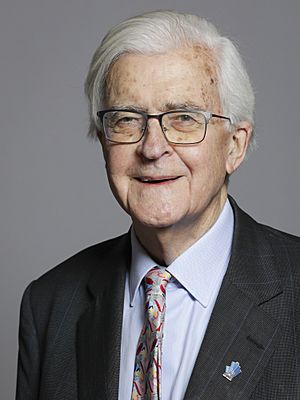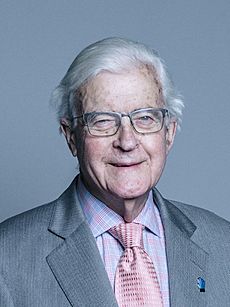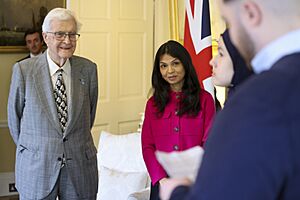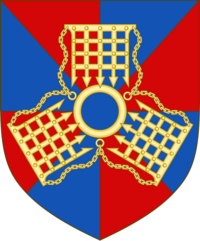Kenneth Baker, Baron Baker of Dorking facts for kids
Quick facts for kids
The Lord Baker of Dorking
|
|||||||||||||||||||||||||||||||||||||||
|---|---|---|---|---|---|---|---|---|---|---|---|---|---|---|---|---|---|---|---|---|---|---|---|---|---|---|---|---|---|---|---|---|---|---|---|---|---|---|---|

Official portrait, 2020
|
|||||||||||||||||||||||||||||||||||||||
| Home Secretary | |||||||||||||||||||||||||||||||||||||||
| In office 28 November 1990 – 10 April 1992 |
|||||||||||||||||||||||||||||||||||||||
| Prime Minister | John Major | ||||||||||||||||||||||||||||||||||||||
| Preceded by | David Waddington | ||||||||||||||||||||||||||||||||||||||
| Succeeded by | Kenneth Clarke | ||||||||||||||||||||||||||||||||||||||
| Chancellor of the Duchy of Lancaster | |||||||||||||||||||||||||||||||||||||||
| In office 24 July 1989 – 28 November 1990 |
|||||||||||||||||||||||||||||||||||||||
| Prime Minister | Margaret Thatcher | ||||||||||||||||||||||||||||||||||||||
| Preceded by | Tony Newton | ||||||||||||||||||||||||||||||||||||||
| Succeeded by | Chris Patten | ||||||||||||||||||||||||||||||||||||||
| Chairman of the Conservative Party | |||||||||||||||||||||||||||||||||||||||
| In office 24 July 1989 – 28 November 1990 |
|||||||||||||||||||||||||||||||||||||||
| Leader | Margaret Thatcher | ||||||||||||||||||||||||||||||||||||||
| Preceded by | Peter Brooke | ||||||||||||||||||||||||||||||||||||||
| Succeeded by | Chris Patten | ||||||||||||||||||||||||||||||||||||||
| Secretary of State for Education and Science |
|||||||||||||||||||||||||||||||||||||||
| In office 21 May 1986 – 24 July 1989 |
|||||||||||||||||||||||||||||||||||||||
| Prime Minister | Margaret Thatcher | ||||||||||||||||||||||||||||||||||||||
| Preceded by | Keith Joseph | ||||||||||||||||||||||||||||||||||||||
| Succeeded by | John MacGregor | ||||||||||||||||||||||||||||||||||||||
| Secretary of State for the Environment | |||||||||||||||||||||||||||||||||||||||
| In office 2 September 1985 – 21 May 1986 |
|||||||||||||||||||||||||||||||||||||||
| Prime Minister | Margaret Thatcher | ||||||||||||||||||||||||||||||||||||||
| Preceded by | Patrick Jenkin | ||||||||||||||||||||||||||||||||||||||
| Succeeded by | Nicholas Ridley | ||||||||||||||||||||||||||||||||||||||
|
|||||||||||||||||||||||||||||||||||||||
|
|||||||||||||||||||||||||||||||||||||||
| Personal details | |||||||||||||||||||||||||||||||||||||||
| Born | 3 November 1934 Newport, Monmouthshire, Wales |
||||||||||||||||||||||||||||||||||||||
| Political party | Conservative | ||||||||||||||||||||||||||||||||||||||
| Spouse |
Mary Elizabeth Gray-Muir
(m. 1963) |
||||||||||||||||||||||||||||||||||||||
| Children | Oswin · Sophia · Amy | ||||||||||||||||||||||||||||||||||||||
| Residences | Iford, East Sussex, England | ||||||||||||||||||||||||||||||||||||||
| Education | Hampton Grammar School St Paul's School, London |
||||||||||||||||||||||||||||||||||||||
| Alma mater | Magdalen College, Oxford (BA, MSc) | ||||||||||||||||||||||||||||||||||||||
| Signature |  |
||||||||||||||||||||||||||||||||||||||
| a. Minister of State for Industry: 5 January 1981 to 12 June 1983 | |||||||||||||||||||||||||||||||||||||||
Kenneth Wilfred Baker, Baron Baker of Dorking (born 3 November 1934) is a British politician. He was a Conservative Member of Parliament (MP) from 1968 to 1997. During his career, he held important government jobs, called cabinet positions. These included Home Secretary and Education Secretary.
After he stopped being an MP in 1997, he was made a life peer. This means he became a member of the House of Lords, another part of the UK Parliament, for the rest of his life. His official title is Baron Baker of Dorking.
Contents
Early Life and Education
Kenneth Baker was born in Newport, Wales. His father was a civil servant, which is someone who works for the government. He went to Hampton Grammar School and later St Paul's School in London.
After finishing school, he studied History at Magdalen College, Oxford, and graduated in 1958. He later earned another degree in International Law. Before becoming a politician, he served in the Royal Artillery in the army and worked for the company Royal Dutch Shell.
Political Career
A politician's job is to represent people and help run the country. Kenneth Baker's career in politics lasted for many decades.
Becoming a Member of Parliament
A Member of Parliament, or MP, is elected by people in a specific area to represent them in the House of Commons. Baker first tried to become an MP in 1964 and 1966 but was not successful. He finally won an election in 1968 for the area of Acton.
He lost this seat in 1970 but was soon elected as the MP for St Marylebone in London. He later represented Mole Valley in Surrey from 1983 until he retired from the House of Commons in 1997.
Working in Government
As an experienced MP, Baker was given important jobs in the government, which is led by the Prime Minister. In 1981, he became the Minister for Information Technology. In 1985, he joined the Cabinet as the Secretary of State for the Environment. The Cabinet is a team of the most important government ministers.
Secretary of State for Education
From 1986 to 1989, Baker was the Secretary of State for Education. This was one of his most famous roles. He made a big change to schools in England by introducing the National Curriculum in 1988. This was a set of subjects that all children in state schools had to study.
He also introduced special training days for teachers. These days became known as "Baker days." During this time, many people thought he might become the next leader of the Conservative Party.
Party Chairman and Home Secretary
In 1989, Baker became the Chairman of the Conservative Party. His job was to help the party prepare for the next general election.
After Margaret Thatcher resigned as Prime Minister in 1990, the new Prime Minister, John Major, made Baker the Home Secretary. As Home Secretary, he was in charge of crime, policing, and immigration. One of his well-known actions was introducing the Dangerous Dogs Act 1991.
Life After Leaving Government
Baker left the government after the 1992 general election. He chose not to run for re-election as an MP in 1997. He was then given the title Baron Baker of Dorking and joined the House of Lords, where he still contributes to making laws.
Focus on Education
Even after his main political career, Baker has remained very involved in education.
University Technical Colleges
Baker helped create the Baker Dearing Educational Trust. This organization helps set up special schools called University Technical Colleges (UTCs). UTCs are for students aged 14–19 and focus on science, technology, and engineering skills to prepare them for jobs.
Views on GCSEs
Interestingly, the man who introduced the National Curriculum now believes that GCSE exams should be abolished. He thinks they are no longer useful for students, who now stay in education or training until they are 18. He argues that the exams don't teach the skills employers want and can cause stress for young people.
Personal Life
Kenneth Baker married Mary Elizabeth Gray-Muir in 1963, and they have three children: Oswin, Sophia, and Amy. His son, Oswin, is a member of the Labour Party, which is a different political party from his father's.
Baker enjoys collecting books and political cartoons. He has written several books himself, including books about British kings and collections of poetry.
In the Media
During the 1980s, the TV puppet show Spitting Image often made fun of politicians. The show famously portrayed Kenneth Baker as a slug.
In 2023, he was being interviewed live on the BBC show Newsnight when his mobile phone kept ringing. The presenter, Victoria Derbyshire, had to take the phone away from him. He joked that the Prime Minister was trying to call him.
Honours
- In 1992, he was made a member of the Order of the Companions of Honour for his service to the country.
- He has received several honorary doctorates from universities in recognition of his work.
Arms
|
 | John T. Biggers |
 | Thomas Blackshear |
 | Mark Bradford |
 | Beverly Buchanan |





